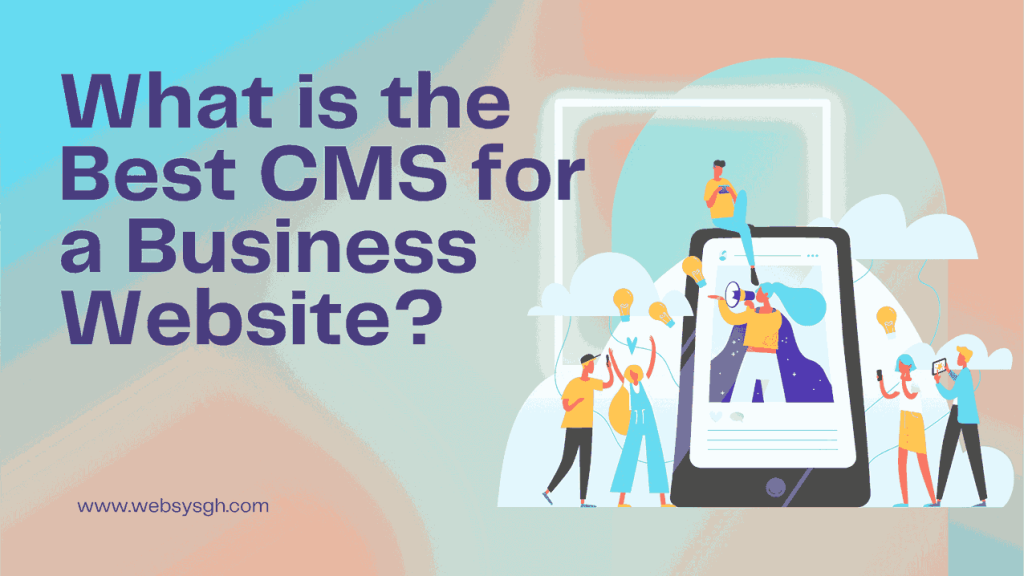A business site needs a CMS that can help it grow. But, it can be confusing for the business owners to know “what is the Best CMS for a Business Website” with tons of options available. We at WebSys believe that “ It really depends directly on what you need.”
For both types of industries, from small businesses to large enterprises, choosing the best CMS for a business website can make a massive difference in how you handle your content and secure your website. Knowing the characteristics of every platform will help you make an informed decision.
Below, the WebSys team is shares which CMS is best for the growth and success of your website. So you can grow seamlessly.
What CMS Options Are Available for Business Websites?
You have many CMS for business websites in 2025. Every platform has something different to offer, and companies are able to choose and mix the features that suit them best. Here is a description of some of the best CMS platforms:
WordPress (2003)
Prize: Free to $45/month (varies by plan)
The most popular small business CMS is WordPress. It’s straightforward to use, you can access thousands of content creation tools, and there are many themes and plugins to select from. It also offers excellent SEO optimisation so your site ranks higher in search engines.
| Pros | Open source, highly customizable and extendable through plugins. |
| Cons | Slows down when you add a large number of plugins. |
| Best for | Small businesses seeking a flexible, affordable CMS. |
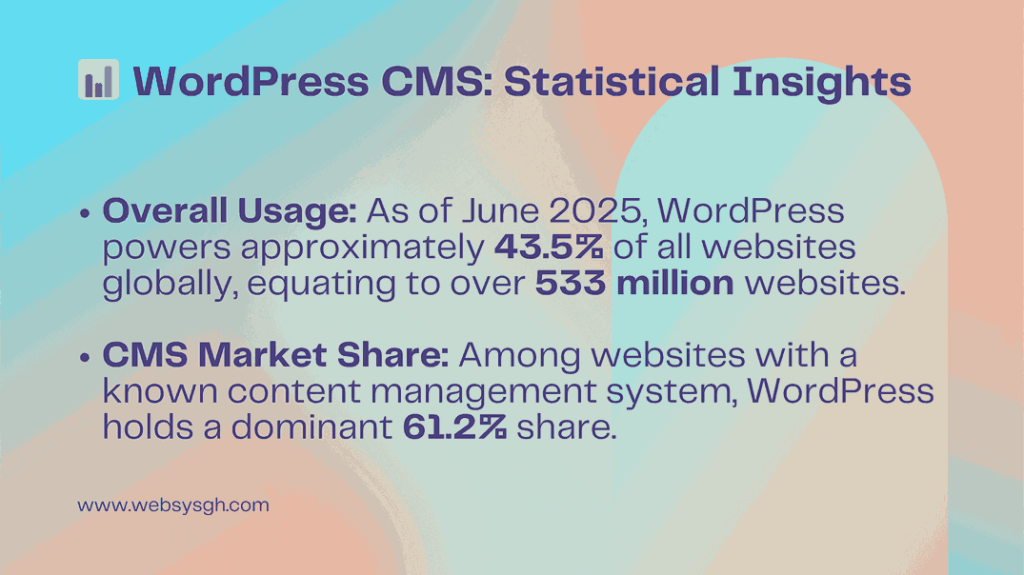
Joomla (2005)
Price: Free, extensions $30-$80
Joomla is an award-winning open-source CMS. It’s a smart option for companies in search of a platform that offers a balance of flexibility and ease of use. It comes with multilingual support, which is awesome if you’re running a global business.
| Pros | Multi Language, best one for a complicated website. |
| Cons | Steep learning curve. |
| Best for: | Companies with moderate technical proficiency, seeking advanced features. |
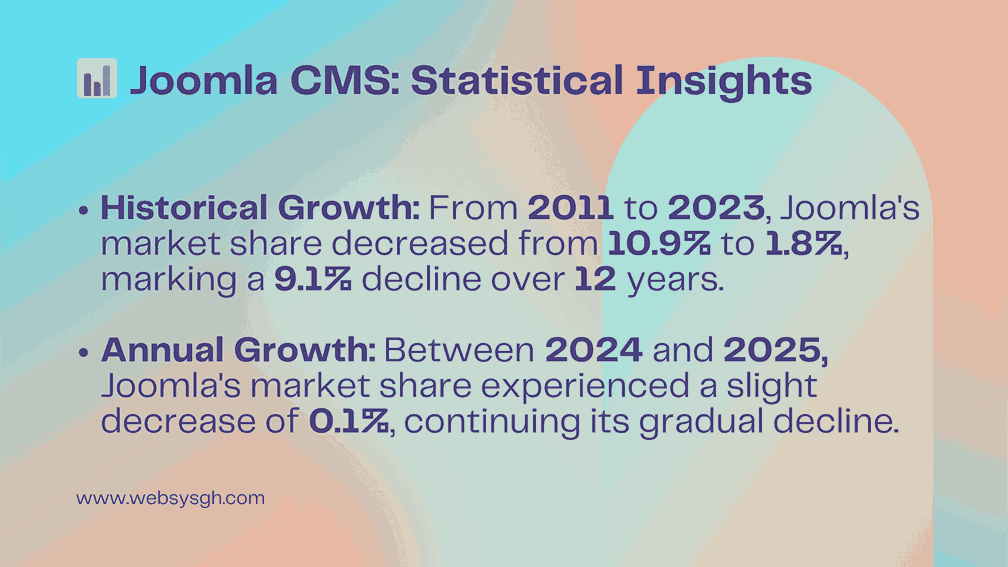
Drupal (2001)
Price: Free, development $5,000-$200,000+
Drupal is a powerful CMS solution that is famous for its scalability and security aspects. It is best suited for businesses that require a website customisation solution capable of handling high-traffic, complex content needs.
| Pros | Highly secure, scalable. |
| Cons | Requires technical expertise. |
| Best for | Big companies or organisations in need of a secure, scalable website. |
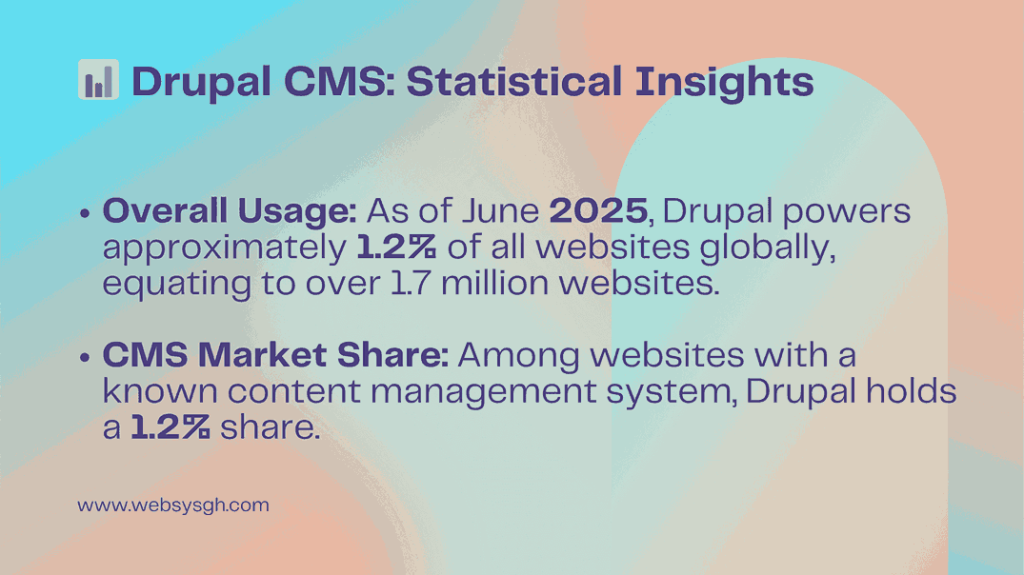
Wix (2006)
Price: Free to $159/month
Wix uses a drag-and-drop builder, which makes it perfect for individuals with no coding experience. It’s very user-friendly and is great for small businesses that require a simple as well as attractive website.
| Pros | Simple to use, mobile-friendly websites, inexpensive. |
| Cons | Less customisation options than some of the other CMS alternatives. |
| Best for | Small businesses without a tech team, those just getting started. |
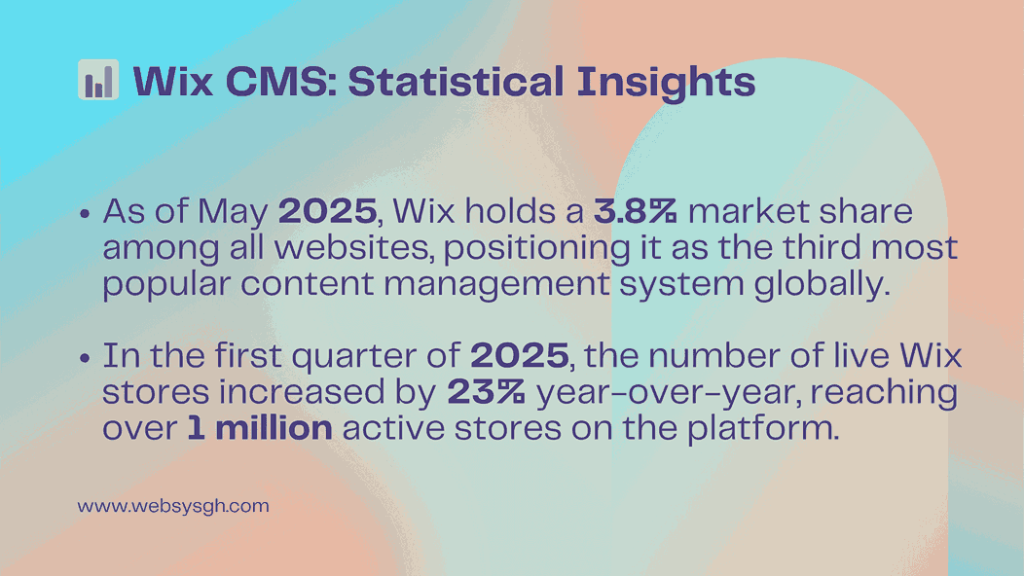
Shopify (2006)
Price: $29 to $2,000/month
When it comes to e-commerce CMS, no other tool stands out above Shopify. It’s tailored for online store management and includes everything you need to establish and manage an online store.
| Pros | Excellent e-commerce features, secure. |
| Cons | Transaction fees, unless you’re using Shopify payments. |
| Best for | E-commerce businesses and entrepreneurs who want to sell products online. |
Squarespace (2004)
Price: $16 to $99/month
Squarespace has beautiful templates and is well-regarded for its user-friendly interface. It’s an ideal option for business websites that require an attractive, mobile-friendly look.
| Pros | Stunning designs, perfect for a small business CMS. |
| Cons | Limited third-party integrations. |
| Best for | Small businesses and creatives seeking a visually appealing website. |
BigCommerce (2009)
Price: $39 to $1,000+/month
BigCommerce is another e-commerce CMS that’s designed for those businesses that are looking to grow their online store. It’s full of features to manage your large product inventory or complex e-commerce platform needs.
| Pros | Scalable, feature-rich. |
| Cons | Expensive for small businesses. |
| Best for | Medium and large businesses that require a robust e-commerce system. |
Magento (Adobe Commerce) (2008)
Price: Free to $125,000/year
Magento is a robust CMS when it comes to enterprise, needing a very rich, highly customisable e-commerce platform. It comes with a wealth of advanced features set for large businesses.
| Pros | Very flexible, excellent for large-scale e-commerce. |
| Cons | Requires technical expertise. |
| Best for | E-commerce Businesses with complicated e-commerce requirements. |
Weebly (2006)
Price: Free to $26/month
If you’re a beginner and want an alternative CMS with lots of hand-holding features, check out Weebly — ideal for creatives and completely beginners due to its intuitive drag-and-drop builder. It works well for small businesses or personal projects that don’t require advanced features but still want an impressive-looking site.
| Pros | Easy to use, affordable. |
| Cons | Fewer features than other tools. |
| Best for | Small businesses looking for simplicity. |
Webflow (2013)
Price: Free to $212/month
Webflow is a combination of visual design tools and online web development capability. It’s ideal for businesses that want full control of their site design without knowing how to code.
| Pros | Very flexible design-wise, no-code platform. |
| Cons | Steeper learning curve. |
| Best for | Design-oriented companies or agencies. |
TYPO3 (2000)
Price: Free, development costs vary
TYPO3 is a highly flexible and scalable enterprise-class CMS. It’s perfect for an organisation that requires a CMS that can manage lots of websites or regions.
| Pros | Very scalable, good for enterprise-level projects. |
| Cons | Requires technical knowledge. |
| Best for | Enterprises, or businesses spanning several regions. |
Ghost (2013)
Price: Free to $199/month
Ghost is a simple content creation-focused CMS. It’s speedy, clean and very easy to use, which is why it’s based on content creation tools like blogging.
| Pros | Lightweight, great for blogs. |
| Cons | Not suitable for more complicated sites. |
| Best for | Content-focused businesses or bloggers. |
PrestaShop (2007)
Price: Free, add-ons $50-$500
PrestaShop is a free, open e-commerce CMS. Good option for any business looking for a free yet effective way to manage their online store.
| Pros | Free, customizable. |
| Cons | Requires technical knowledge. |
| Best for | Companies looking for an open-source e-commerce solution. |
Craft CMS (2013)
Price: $299/year (commercial license)
Craft CMS is a robust, adaptable CMS that is customised to businesses which need a more complex structure on their website.
| Pros | Come with a lot of customizable features, good for content-heavy sites. |
| Cons | Requires some technical expertise. |
| Best for | Developers and businesses that require special features from a website. |
Zyro (2019)
Price: $2.99 to $14.99/month
Zyro is an easy-to-use website management tool with built-in AI tools to enable companies to build websites as fast as they want with minimal effort.
| Pros | Fast, AI-powered tools. |
| Cons | Not as customizable as other CMS solutions. |
| Best for | Small business owners looking for a fast and easy website setup. |
Contentful (2013)
Price: Free to $489/month
Contentful is a headless CMS, which means businesses can control their content independently of how it’s displayed. It is a powerful way to build custom digital experiences.
| Pros | Flexible, API-driven. |
| Cons | Requires developer knowledge. |
| Best for | Companies in need of a scalable, tailor-made content management system. |
Final lines: So, Which CMS Stand Out as the Best One
If we at WebSys were to answer the question “What is the Best CMS for a Business Website?” based on our 10 years of experience in web development and designing, we would say “it only depends on your business goals and requirements.”
The best CMS for a business website is the one that fits your particular needs. Whether we’re talking about CMS for small businesses and CMS for e-commerce, every CMS has its own ways of customising websites, SEO capabilities and content management system features.
Pick a platform that suits your business model, your budget, and your growth targets. Whether you want a drag-and-drop CMS like Wix or a feature-packed e-commerce system like Shopify, ensure your CMS of choice will support your plans for the future.
If you need professional assistance with setting up the CMS for your business website, WebSys would be happy to help you with its expertise.
So, please feel free to contact us anytime.
Reference:

